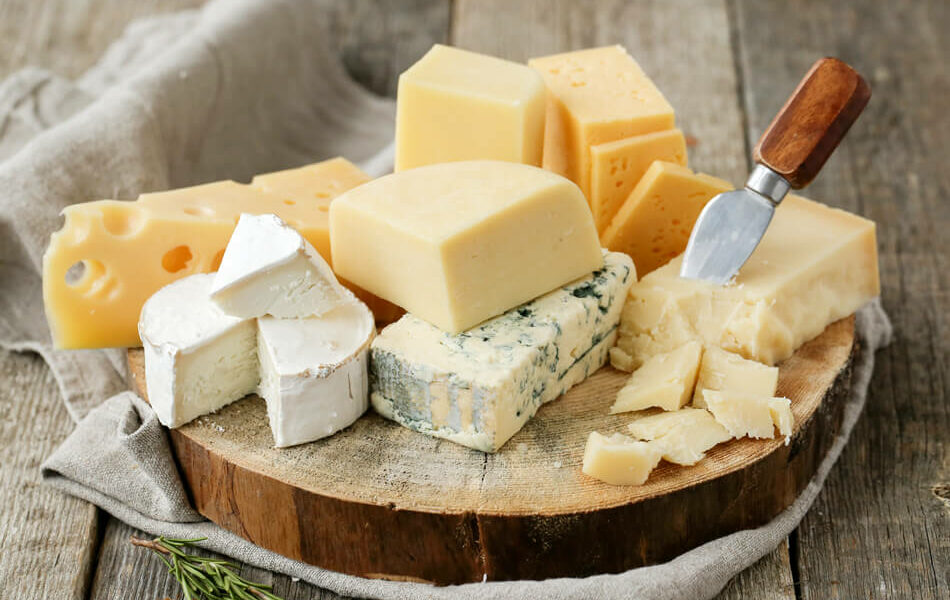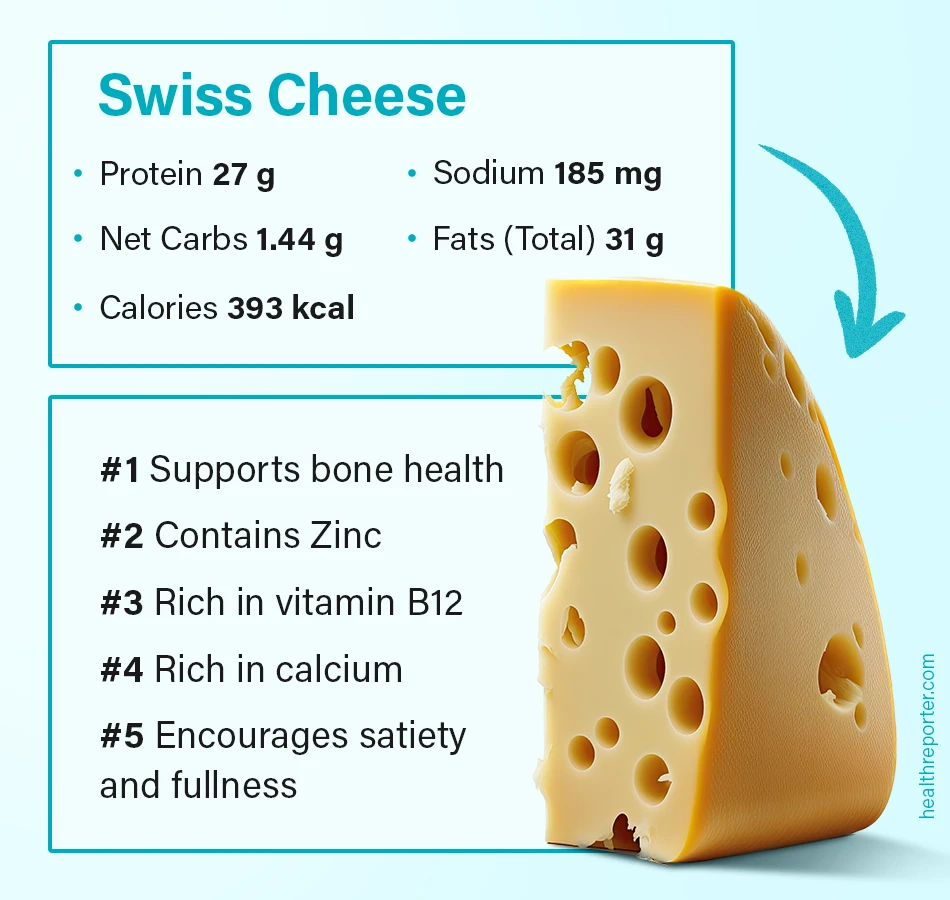Is Swiss Cheese Healthy? Calories, Carbs and Nutrition Facts
Swiss cheese is a popular cheese choice for sandwiches, fondue, or even just eating on a nice buttery cracker. However, its nutritional profile may not make it quite as ideal.

Are you wondering if Swiss cheese is a healthy choice to add to your meal? There are many nutritional factors to consider when deciding on a type of cheese and how much to consume.
Especially for those with heart disease or other chronic health conditions, cheese can be a source of concern, and they may wonder how to safely and healthily incorporate it into their diet.
Let’s take a deep dive into the nutrition of Swiss cheese and its health benefits to see if it is a good choice for you.
Is Swiss Cheese Healthy?
Swiss cheese is healthy in moderation. While it provides protein, calcium, phosphorus, and other beneficial nutrients, it is high in saturated fat and sodium.
However, Swiss cheese typically has less fat and sodium than other cheeses.

Is Swiss Cheese Good for Weight Loss?
A slice of Swiss contains only approximately 90 calories. However, since Swiss cheese contributes a high amount of fat, it is not a good option for weight loss.
A 100g serving of Swiss cheese, which equates to about five slices of cheese, contains a whopping 31g of fat. In other words, about 6g of fat per slice. A little over half that fat is saturated fat.
Saturated fat is a type of lipid found primarily in animal products, such as full-fat dairy, meat, and some oils.
According to the American Heart Association, saturated fats are solid at room temperature and can increase cholesterol levels and, therefore, the risk of heart disease, including high blood pressure, heart attack, and stroke.
When deciding on a type of cheese at the grocery store, opt for a reduced-fat option.
Additionally, Swiss contains 185mg of sodium per 100g serving. This amount is relatively low, with 400mg as the standard for a “high-sodium” food.
Check out one of our articles for more information on cheese consumption and weight loss.
5 Benefits of Swiss Cheese
While there are some downsides and health implications of consuming Swiss, let’s start by discussing some of the health benefits.
#1 Supports bone health
Most cheeses made from cow’s milk, including Swiss cheese, are high in phosphorus. For example, a 100g serving of Swiss cheese contains almost 575mg of phosphorus.
According to the National Institutes of Health, phosphorus is an essential mineral that supports healthy bones and teeth, along with calcium and others.
Phosphorus also helps with pH maintenance, cell structure, and more.
Adding a good source of phosphorus, such as cheese, to your diet can help maintain strong bones, especially as you age or grow.
Another great way to reap the health benefits of phosphorus is to consume cottage cheese and cheddar cheese.
#2 Contains Zinc
Eating Swiss is a great way to support a healthy and strong immune system, primarily through the presence of the mineral zinc.
A 100g serving of Swiss cheese contains over 4mg of zinc, which is a mineral responsible for wound healing, taste and smell, and proper metabolism functioning.
The primary function is supporting a healthy immune system that can fight off pathogens and disease. Adding Swiss cheese to your diet and other nutritious zinc sources can help keep your immune system strong.
Additional ways to boost your immunity are pairing your Swiss cheese with fresh fruits and vegetables rich in vitamin C, such as strawberries, oranges (and other citrus fruits), and bell peppers.
#3 Rich in vitamin B12
Swiss is a good source of vitamin B12 with 3.02mcg per 100g serving.
Vitamin B12 is an essential nutrient that must be consumed in the diet because our body cannot make it.
It functions to help produce red blood cells, make genetic material like DNA, and much more.
Vitamin B12 is only found in animal-based products such as meat, poultry, fish, eggs, and dairy. However, it is often fortified in other non-animal foods, such as nutritional yeast. The recommended daily amount of this vitamin for most adults is 2.4 mcg per day.
#4 Rich in calcium
In addition to bone health, one of the health benefits of Swiss may be protecting teeth as well, based on a recent study.
Swiss cheese may promote healthy teeth due to the fact that it is made primarily from cow’s milk. Cow’s milk is rich in calcium which supports strong bones and teeth.
In a study performed in 2015 in Caries Research Journal, researchers studied the dietary habits of children and adolescents. More specifically, they studied the dairy intake of children and adolescents.
When examining a participant’s number of dental cavities with their dairy intake, researchers found that increased dairy consumption was correlated with a decreased number of cavities.
Since this was a correlational study, not a causational experiment, it is unclear whether the decrease in cavities was related to the dairy products they consumed or if another variable was at play.
More research is needed to confirm that dairy products such as Swiss cheese can aid in preventing cavities.
#5 Encourages satiety and fullness
Since Swiss cheese is a good source of fat and protein, it can help you feel full after eating. While Swiss contains saturated fat, it also contains monounsaturated and polyunsaturated fatty acids.
Overall, healthy fats help with the feeling of fullness and satisfaction. This is especially true if the cheese is paired with a high-fiber source, such as whole grain bread and vegetables.
While relatively low in calories, Swiss is also rich in a nutty flavor, similar to cheddar cheese, so only a small amount is needed to reap the health benefits.
Downsides of Swiss Cheese
Swiss cheese is a popular cheese, but like all dairy products, it has some downsides.
#1 Contains sodium
While Swiss cheese is not that high in sodium compared to other cheeses, it still contains a significant amount. People who are on a low-sodium diet should be careful about how much Swiss cheese they consume.
#2 High in fat
Swiss cheese is also high in saturated fat, sodium, and cholesterol, so it is best to focus on getting your fat from unsaturated fat sources.
Healthy fat sources include extra virgin olive oil, avocados, nuts and seeds, and more.
Swiss Cheese Nutritional Facts
From vitamins and minerals to fat and calories, let’s dive into the nutritional information for Swiss cheese.
Nutritional table (per 100g)
| Calories/Nutrient | Amount |
| Calories (kcal) | 393 |
| Calcium (mg) | 890 |
| Net Carbs (g) | 1.44 |
| Sodium (mg) | 185 |
| Fiber (g) | 0 |
| Sugar (g) | 0 |
| Fats (Total) | 31 |
| Protein (g) | 27 |
| Cholesterol (mg) | 93 |
High in protein
Cheese is a relatively good protein source with about 5g per slice of Swiss.
Protein is essential to support the growth and repair of muscles. It becomes especially important during periods of growth, including childhood, pregnancy, and breastfeeding, as well as for athletes.
Additionally, protein is very important for human life as it is needed for every chemical reaction in the body.
When paired with a lean protein, such as baked chicken breast on a sandwich or a turkey burger, Swiss cheese can help build a healthy and balanced meal.
Add a glass of milk or non-dairy milk alternative to add even more protein, calcium, vitamins, and minerals.
High in calcium
Since Swiss cheese is made primarily from cow’s milk, a 100g serving of Swiss cheese contains a whopping 890mg of calcium.
One of the main benefits of cheese is its calcium content. According to the National Institutes of Health, calcium helps support strong bones and teeth.
Calcium makes up our bones’ structure by keeping them strong and flexible.
Calcium also supports muscle and nerve functioning, hormone secretion, blood clotting, and more.
Low in carbohydrates
While dairy is a significant source of carbohydrates, cheeses such as Swiss have such a small amount of carbohydrates that it can almost be considered negligible.
While many would like to consume foods with no carbohydrates and sugars, it is essential to note that foods void of carbs are also fiber-free.
Fiber is essential to a balanced and healthy diet as it is needed for a healthy digestive system and gastrointestinal tract.
The general recommendation is that women consume 21g of fiber when under 50 years old and 30g when over 50. Similarly, men must consume 25 and 38g of fiber, respectively.
High in cholesterol
Cholesterol is a type of fat produced in the liver of animals and humans. Therefore, we do not need to eat any cholesterol in our diet to survive.
However, we consume cholesterol when we eat animal products, such as meat, poultry, eggs, and dairy.
Eating excessive amounts of cholesterol can build up in our arteries as plaque and eventually cause the arteries to harden and narrow.
The plaque can build up so much that the artery gets completely blocked and can cause high blood pressure, a heart attack, or a stroke.
A 100g serving of Swiss cheese contains about 90mg of cholesterol.
While the recommendation was to consume no more than 200–300mg of cholesterol daily, the 2020–2025 Dietary Guidelines for Americans (DGA) now recommends consuming as little as possible.
Low in calories
The serving size of 100g of Swiss cheese only contains 393 calories. Therefore, eating Swiss cheese can be a good option if you are looking to reduce your caloric intake.
If you are looking for another low-calorie cheese option to cow’s milk cheeses, such as cottage cheese, mozzarella cheese, ricotta cheese, and gouda cheese, try goat cheese, which is one of the healthiest cheeses.
A Word From a Dietitian
Overall, Swiss cheese is a tasty semi-hard cheese with distinctive holes. Swiss cheese is an excellent source of calcium and some protein. However, it is high in fat, including saturated fat.
Saturated fat can contribute to high blood pressure, atherosclerosis, and coronary artery disease.
It can still be part of a balanced and healthy diet if consumed in moderation.
Opt for the reduced-fat version when buying Swiss cheese from the grocery store and only use a slice or two in your food.
You could instead choose a lower fat cheese such as cottage cheese that has a skim variety.
FAQs
Swiss cheese is a good source of calcium. However, it contains 185mg of sodium and 31g of fat per 100g serving and should be eaten in moderation.
One slice of Swiss cheese, which is approximately 2g, contains only about 78 calories.
Based on its moisture content, Swiss cheese is a semi-hard cheese.
Swiss cheese is commonly used for sandwiches, fondue, burgers, and more.
Swiss cheese is high in saturated fat and even contains a small amount of trans fat. Therefore, consume Swiss cheese in moderation to avoid heart disease, including high blood pressure.
For a balanced meal, eat Swiss cheese with a source of whole grains, lean protein, fruit, vegetables, and other healthy food.
Swiss cheese is high in saturated fat and sodium, which can be detrimental to heart health. Therefore, it is important to enjoy Swiss cheese in moderation as part of a balanced diet.
Conclusion
Remember to enjoy Swiss cheese in moderation. A slice or two is relatively low in calories; however, it tends to be high in fat, which is not ideal for those with high cholesterol or heart conditions.

















































 Select your language:
Select your language: 








